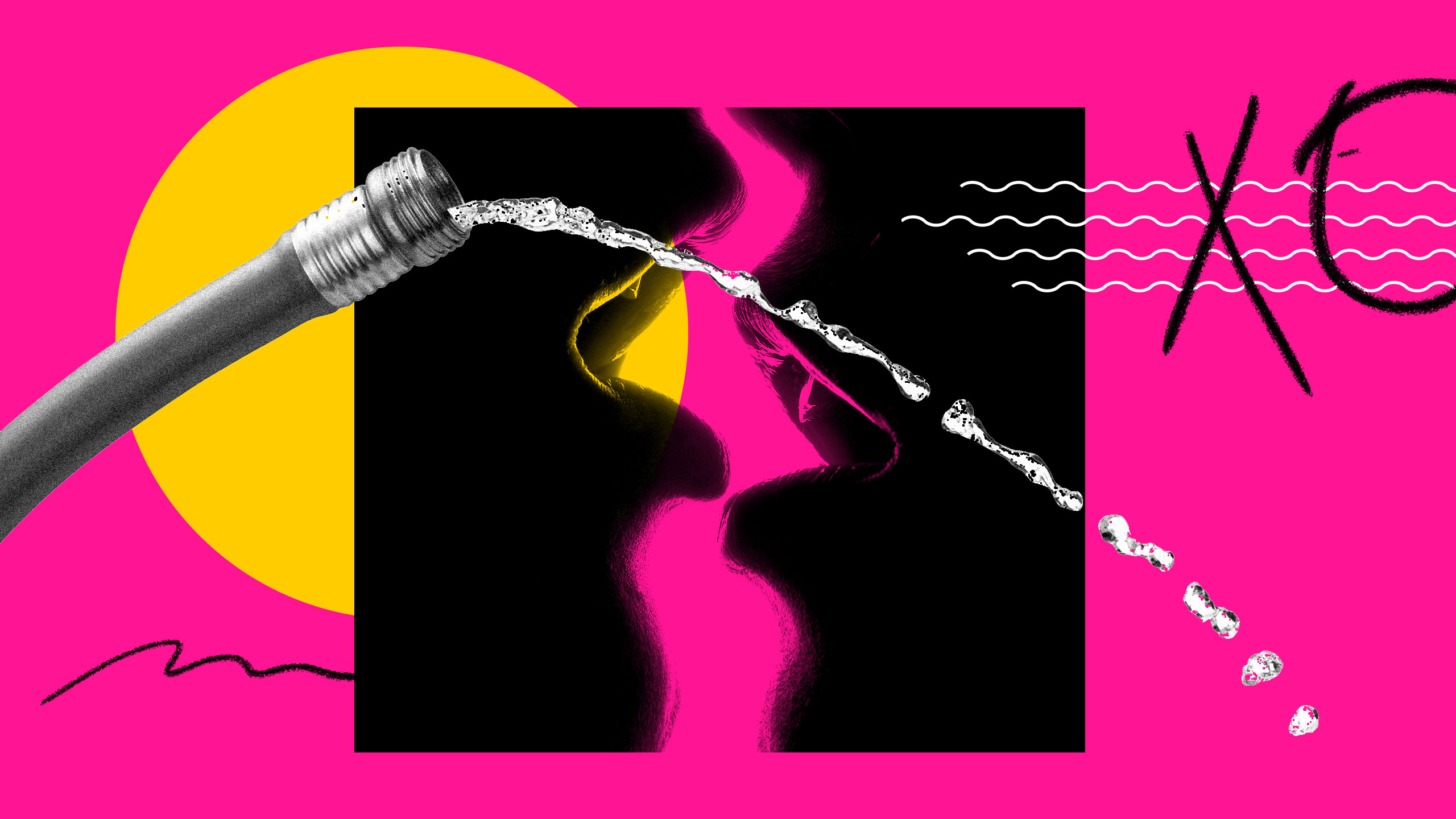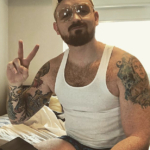As I walked to get my queer-affirming iced coffee early last week, I ran into an attractive bearded man in a skimpy tank top bearing the phrase, “Vaccinated, intoxicated and ready to get impregnated.” As we each waited for our coffees, I complimented his shirt, we chuckled and then made prolonged eye contact above our masks. The sexual tension could be cut with a splash stick.
Living in Toronto’s gay village, casual instances like these are not uncommon. But since the pandemic has turned our lives upside down, anything more than sexually-charged eye contact has been put on pause, seemingly indefinitely.
As of the second week of July, nearly 44 percent of eligible Canadians have been fully vaccinated and 69 percent have received at least one dose of the vaccine. But even as Canada shoots up the rankings of countries getting their populations vaccinated, we’re still not out of the woods: considering Toronto has been upsettingly anointed the “lockdown capital of North America,” and according to the BBC, we’re the home of “one of the world’s longest” lockdowns.
Juggling a painfully slow start to vaccinations with a promising follow-through, how can we live our best “hot vax summer” without putting ourselves and others at risk?
Are we even ready to hook up?
I asked Canadians on Instagram if they plan on having a “hot vax summer” given our current circumstances. By nature of it being an Instagram poll, the respondent pool was evidently small and skewed. Still, 74 percent of the 120 votes responded “yes.” Next, I followed up to ask about precautions.
“I’m going to have sex outdoors and wait until I get my second dose for indoor hookups,” Doug, 34, wrote in my DMs. Abed, 46, plans to use glory holes, which have been recommended by both New York City health officials and the B.C. Centre for Disease Control as a way to reduce risk during pandemic hookups. Abed adds that he recently set one up in his apartment using duct tape and a bed sheet. (While both Doug’s and Abed’s strategies reduce the risk of transmission, it should be noted that you can still contract COVID-19 outdoors if you are not wearing a mask or staying six-feet apart from others.)
The majority of poll respondents seemed to agree that some precautions are necessary. Most said they’re only going to hook up with people they trust and who have had at least one vaccine dose. Many also expressed that they plan to wait two weeks between sexual encounters so they can assess any potential symptoms.
How protected am I with one dose of vaccine?
Nobody really knows for sure, and the Canadian government has yet to offer formal guidance on what people can do between vaccinations.
All we can do for now is look at the research currently available: one study published in The Lancet found that the Pfizer vaccine is at least 70 percent effective at preventing COVID-19 three weeks after the first dose. A larger study, also published in the same medical journal, found that the vaccine was more than 90 percent effective at preventing hospitalization four to five weeks after the first dose.
The first dose of the AstraZeneca vaccine was found to be 88 percent effective at preventing COVID-19-related hospitalizations, and an additional study found that a single dose of either vaccine reduces household transmission between 39 and 49 percent.
If you anticipate loosening the reins on sexual activity, wait at least three weeks after your initial vaccine dose. After that period, the first dose significantly reduces the likelihood that you will spread the virus. It also reduces the chance that you’ll develop severe symptoms, but it doesn’t eliminate the risk of getting sick entirely.
If you’re fully vaccinated, the likelihood of being symptomatic is dramatically reduced, and you’re considered almost completely protected against severe COVID-19-related sickness or death. There is also some evidence that fully vaccinated people are less likely to pass the virus to other people. People are considered fully vaccinated two weeks after their second dose is administered (or two weeks after a single-dose vaccine, like Johnson & Johnson’s Janssen vaccine).
What questions should I ask a potential sexual partner?
Since our individual vaccination status will be all over the place this summer, Eva Bloom, queer sexuality educator and author of the e-book A Compassionate Guide to Sex and COVID-19, says communication is especially important. She tells Xtra that people can ask questions like:
- How many people are in your household or bubble?
- Have you been vaccinated? One dose, or two?
- How long has it been since your vaccination?
- What do the people in your household or bubble do for work? Does anyone have a job that requires them to work in-person with the public, like front line health care, teaching or bartending? Have they been vaccinated?
- What are your mask-wearing and physical distancing habits?
- Have you had sex with any other people in the last two-to-four weeks? If so, how many? What precautions did you take?
Based on their answers, you can better assess the risks involved in hooking up. It might seem like a lot of work—especially when social media mutuals in other countries are out posting about their maskless adventures and sexual exploits—but Canada’s not there yet. In the meantime, a little precaution will go a long way in keeping everyone safe. As Bloom concedes, “We can still have a Hot Vax Fall.”
I’m ready to hook up! What are some ways I can reduce risk?
Even after two vaccine doses, there’s still a chance of contracting or spreading COVID-19. The San Francisco Department of Public Health has put together a fantastic tip sheet for safer sex during the pandemic, which is regularly updated as we learn more about the virus.
Among other things, the sheet recommends quickies (since being within six feet of people for 15 minutes or more increases the chances of transmitting the virus); having sex outdoors or in large, well-ventilated spaces (make sure you open the windows, turn on fans, etc.); having a “sex buddy” or limiting the number of sexual partners you have; getting off online (while being careful who you share images/videos with) and so on.
“The same sexual health strategies you used before COVID-19 still apply,” Dane Griffiths, director of the Gay Men’s Sexual Health Alliance (GMSH), says. “If you aren’t feeling well, then avoid having sex with anyone until you feel better or until you get a negative COVID-19 test result. I know that’s really subjective, so people need to be honest with themselves.”
“As you learn more about your partner and the risks in other parts of their lives, you might change partners or change the nature of the sexual activity.”
Keep in mind that the virus can also spread through saliva and mucus, and has been found in fecal matter and seminal fluid—in fact, the only fluid the virus has not been found in is vaginal. (That said, there is no evidence to date that SARS-CoV-2—the virus that causes COVID-19—is transmissible through non-respiratory fluid.) That means there’s a possibility that even sex acts where face-to-face contact is less common (such as oral, or using toys or fingers with spit on them) may transmit the virus. For these reasons, it’s recommended you wear a condom for oral and anal sex.
“It’s important you consider various risk factors of people around your sexual partner as well,” Bloom says. Do they have roommates? Do they work from home? Do they get tested regularly? “Another option is to find your casual partner within your bubble, like a friend of a friend. This may increase your awareness of their bubble, and reduce the number of people you are in close contact with.”
Since COVID-19 symptoms can take up to 14 days to appear and people can become sicker one to two weeks after that, you might want to reassess risks every four weeks or so and adjust your habits accordingly. For instance, as you learn more about your partner and the risks in other parts of their lives, you might change partners or change the nature of the sexual activity.
Anything else I should consider?
Given our community’s past with lethal epidemics and the fact that we’re disproportionately at risk for COVID-19, queer and trans people are proving quite adept at taking care of our health throughout the pandemic.
“Many of us have experienced the impacts of the HIV epidemic first-hand and are active in caring for our sexual health,” Griffith says. “That being said, the same sexual health strategies you used before COVID-19 still apply. Get tested for HIV and other STIs regularly, including oral and rectal swabs. If you aren’t on PrEP or have stopped, then consider starting (or restarting) in consultation with your provider.”
“It’s important we talk about COVID-19 like we do other viruses and infections that can be transmitted during sex.”
Generally speaking, there has been a significant decrease in STI rates across Canada over the past year plus, though they’ve fluctuated as restrictions have changed. During the height of the pandemic, many sexual health clinics reduced their hours, only accepted patients who booked ahead with “urgent concerns,” and many wouldn’t allow walk-ins. So while people’s cautious sexual behaviour might contribute to these statistics, fewer testing opportunities had an impact as well.
As such, it’s important we talk about COVID-19 like we do other viruses and infections that can be transmitted during sex. Include the questions offered by Bloom when asking a potential partner when they were last tested for STIs, HIV, etc.
And while it’s crucial that we prioritize our own health while navigating these unprecedented times, it’s also important we don’t shame others for their behaviour. Should someone become infected or test positive, remind yourself that people aren’t positive and negative, tests are. Stigmatizing and bullying only add fuel to public health crises.
Rather, try to remember that we’re all living in difficult times—each of us have different lived experiences, circumstances and ways of coping. Practice caution, compassion and communication this Hot Vax Summer, and remember that we’re all in this together.


 Why you can trust Xtra
Why you can trust Xtra


